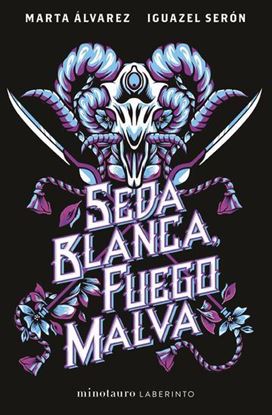

SEDA BLANCA, FUEGO MALVA (OF2)
Una novela de fantasía de inspiración asiática.
La princesa Jisun de la dinastía Beongae, hija de las Tormentas, ha desaparecido.Todo empezó con el atentado: un infierno de llamas malvas que ni siquiera los monjes del Sol lograron controlar. Nadie sabe quién está detrás, ni tampoco que la princesa ha desaparecido. Su hermano, el príncipe Jisoo Beongae, ha de encontrarlos a ella y a sus secuestradores, y deberá hacerlo en secreto, pues los responsables del fuego malva podrían esconderse en cualquier parte: en las otras dinastías, en ese barco del Continente que ha arribado a las costas losbitas por primera vez en dieciséis años…o entre las sombras del propio palacio Beongae.
Por desgracia, Jisoo se verá obligado a aceptar a tres compañeros de viaje: Aiya, una monje del Sol, rival de los Beongae; Dharani, una descarada bailarina que domina la magia del Eco, y Conreth, un extranjero venido del Continente en misteriosas circunstancias. Mientras tanto, en algún lugar del imperio, Bian, una joven sin magia, hace germinar una flor.
500
SEDUCIENDO A MR. BRIDGERTON(BRIDGERTON 4
A sus veintiocho años, Penélope se ha resignado ya a convertirse en una solterona destinada a envejecer cuidando a su madre. Durante una década, ha asistido a todas las fiestas de la aristocracia londinense, y siempre ha sido la muchacha mediocre, callada, la que nadie saca a bailar más que por compromiso, la que pasa inadvertida para todos. También para Colin Bridgerton, hermano de la mejor amiga de Penélope, guapo, audaz, soltero de oro... y su amor platónico desde siempre. Para Colin, Penélope siempre ha estado ahí, simpática, agradable, pero casi invisible. ¿Cómo es posible que todo cambie de repente? Sin saber bien cómo, el menor de los Bridgerton descubre a una mujer inteligente, sensible, audaz... y muy atractiva. Durante años se han conocido casi como hermanos, y de repente se dan cuenta de que no saben nada el uno del otro. Pero no todo lo que descubrirán va a resultar tan placentero...
1,200
SEGUNDO LIBRO DE CRONICAS
La vida en todas sus formas, las anécdotas de infancia y el recuerdo de amigos desaparecidos, una calle de Lisboa, un árbol en el jardín familiar, un viaje a Italia, una noche en un hotel de Munich, la entrega de un premio literario, la inspiración, la dificultad de escribir... La vida de António Lobo Antunes en todos sus aspectos conforma el universo de las crónicas que el autor portugués viene ofreciendo desde hace años en distintas publicaciones periódicas de todo el mundo. Estas crónicas, y las que se publicarán en sucesivos volúmenes, representan lo más parecido a la autobiografía de uno de los escritores cruciales del panorama literario mundial.
1,350
SEGUNDO LIBRO DE LOS OLVIDOS
Este es el tren de Alfonso. Aquí va Alfonso en su tren pasando por el país de la Poesía. Pasan pueblitos, ciudades, países, épocas, gentes, sueños, fracasos, muchos fracasos y sueños de nuevo; pasa todo lo que, gracias a Dios, es todavía, y lo que fue o está lejos o aún no ha sido. Es el viaje de un príncipe de la nostalgia, de un mago de la palabra, de uno de los grandes elegíacos de la América de estos tiempos, que, sin embargo, en algún momento de humildad extrema, ha dicho de sí mismo: «Fui apenas un hombre tontamente triste». El mismo mago, el mismo gran poeta que, dos curvas del tren más allá, volviendo sobre sí mismo, confesará, melancólico: «He cambiado tantas veces de casa, he vivido tantas vidas». No es este, pues, pasajero, como enseguida comprenderás, el tren que va, es el tren que vuelve, que seguirá pasando eternidad tras eternidad, de ahí sus aullidos, su estrépito, su desafuero de gran viaje del corazón. Acomódate junto a tu ventanilla, y siéntelo.
1,350
SEGURANT
Segurant abandona su tierra natal, la Isla Ignota, para reunirse con el Rey Arturo y desafiar a sus paladines. A lo largo de su camino, gana innumerables torneos, despertando la admiración de los caballeros de la Mesa Redonda. Pero dos hechiceras, Morgana y Sibila, conjuran la imagen de un dragón que escupe fuego por la boca, y Segurant se lanza en su persecución. Las extraordinarias aventuras de este caballero de la Mesa Redonda que habían caído en el olvido durante siglos han sido redescubiertas ahora por Emanuele Arioli, un joven medievalista que recorrió las bibliotecas de toda Europa en busca de los manuscritos de esta historia del ciclo artúrico. Tras más de diez años de investigación, Emanuele Arioli presenta ahora el texto de esta novela perdida por primera vez en español. Con ilustraciones de los manuscritos originales, Segurant es una narración inédita que se revela como un cruce de leyendas y culturas, y como uno de los grandes acontecimientos literarios de este siglo.
995
SEIS CUATRO (BOL)
En enero de 1989, una niña de siete años fue raptada al norte de Tokio. Los padres nunca llegaron a saber la identidad del secuestrador. Tampoco volvieron a ver a su hija. Nombre en clave del caso: Seis Cuatro.
Más de una década después, el jefe de prensa de la policía se ve obligado a volver sobre el suceso, cuyo estigma no se ha diluido en el tiempo: el fracaso de la investigación sigue siendo motivo de escándalo. Pero el veterano Mikami no aspira ya a resolver el crimen, solo pretende tender una mano a la familia de la víctima y contribuir de algún modo a limpiar la reputación del cuerpo. Sin embargo, tras detectar una irregularidad en el expediente, Mikami acabará desvelando el móvil de un delito que encierra secretos inimaginables.
950














